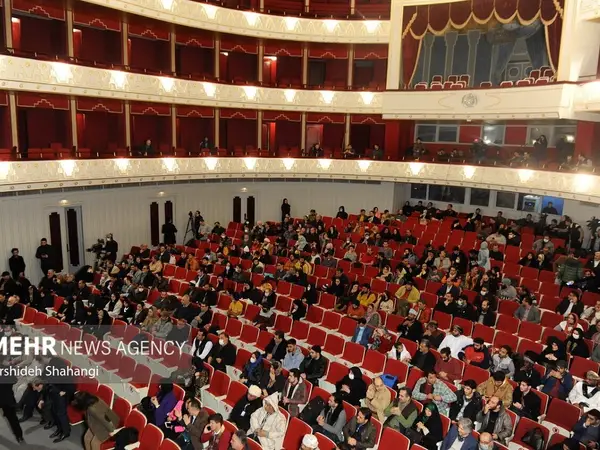Iran’s Fajr Film Festival, the Islamic Republic’s biggest, has been snubbed by moviemakers and moviegoers amid ongoing protests all over the country.
The film festival is part of a series of events to mark the 44th anniversary of the Islamic Revolution marked by 10 days of state-sponsored ceremonies dubbed the decade of Fajr – which literally means dawn.
The trio of festivals – along with a theater and a music festival – have faced boycotts by numerous artists and art enthusiasts in recent years, but the current wave of protests and the regime’s heavy-handed crackdown seems like the coup de grâce to the most significant propaganda gala of the Islamic Republic.
Despite the government’s efforts to portray the events as popular as they used to be a decade ago, the theater festival was inaugurated in the sparsely attended Vahdat Hall this week.
It is ironic that even the most “prestigious” cultural events of the Islamic Republic are held in halls constructed prior to 1979 in the era of monarchy, as the clerical regime never truly invested in culture, and considers most of its representations un-Islamic except for a couple of weeks during the celebrations for the establishment of the Islamic Republic.
Even though photos of the empty hall during the theater festival’s opening ceremony were reported even by state media and outlets affiliated with the Revolutionary Guards, Mohammad Mehdi Esmaili, the Culture and Islamic Guidance minister, said that the event was welcomed by the people.
Since the beginning of the ongoing uprising in mid-September, many celebrities were banned, arrested or summoned by the judiciary for their solidarity with the current movement. Some of the most popular actors and artists even emigrated from the country to be able to express their support for the antigovernment protests freely and without fear of arrest.
Many actors and filmmakers had announced their boycott of the festival weeks before the start of the event, prompting the authorities not to announce the films selected to be screened during. Something unprecedented that took place this year was that the tickets for the movies were sold without the names of the works, because the government feared that if it announced the flicks, more artists would announce their opposition to the event. Of course, their trick turned out to be ineffective as some actors actually announced their boycott after their films were selected for screening, such as Haniyeh Tavassoli. Most of the actors, actresses and even directors do not have a say in the screening their movies because almost all of the productions in Iran are sponsored by state organizations.
The festival had always been dominated by the works produced by government organizations and propaganda institutes but this year the level of audacity of the regime is even higher as authorities have announced that no movies that draw a grim portrait of the society were selected for screening. The committee tasked with selecting the movies is comprised of regime insiders, some of whom were not even film industry figures, such as Reza Pourhossein, a cultural manager and a professor of psychology at the University of Tehran.
The secretaries of the festivals and their juries are also selected from the figures close to the regime and known for works that promote regime propaganda, such as the secretary of the film festival Mojtaba Amini, a producer who was involved in the attacks on the Saudi embassy when it was ransacked by IRGC’s basij militias in January 2016. The secretary of the Theater festival called those who boycott the event “cultural dictators” at the opening ceremony.
The antigovernment protests, coupled with economic woes and political uncertainty, have clouded the cultural landscape of the country so much that the culture minister was reported asking theater directors and singers to start holding performances so that the regime can pretend the situation is back to normal.
